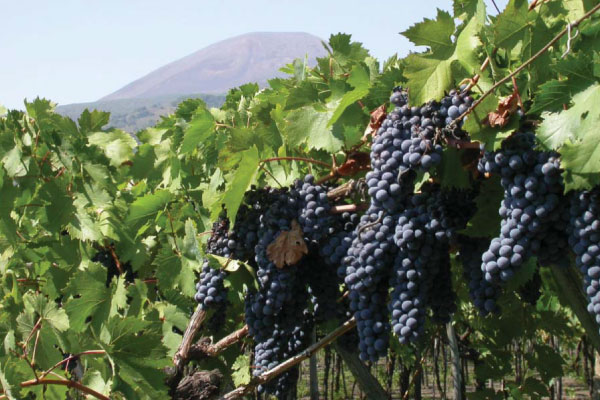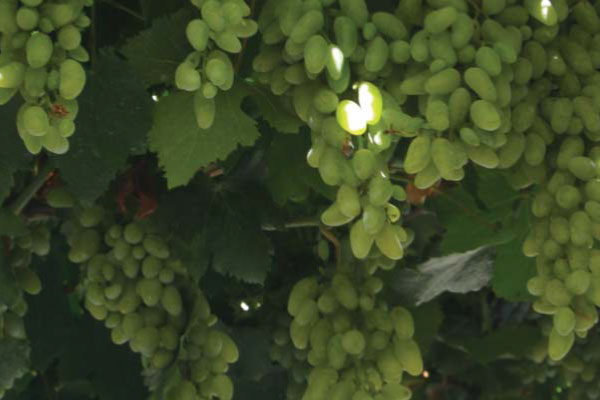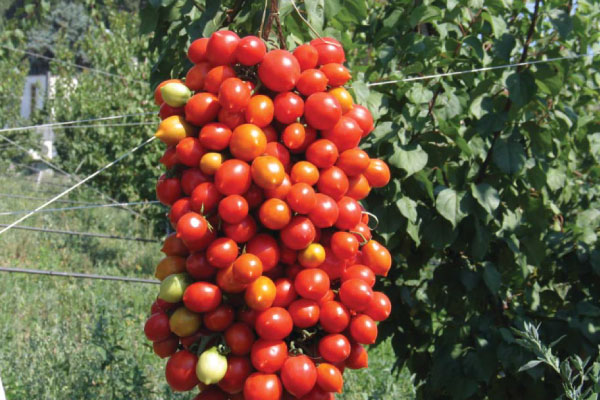Since the most remote times man settled on the slopes of Mount Vesuvius.
The fertile soil of the volcanic rocks, the temperate climate with mild winters due to the influence of fresh and humid currents that blow from the sea and the hot and dry summers led to the development of a flourishing and very varied agriculture.
In Roman times the true nature of the Vesuvius was ignored, while the fertility of its slopes, rich in minerals and especially potassium, was well known.
The vine occupies the most important place among the Vesuvius agricultural productions; it was introduced in Campania by the Greeks over 3,000 years ago.
© Giovanni Romano
The vine occupies the most important place among the Vesuvius agricultural productions; it was introduced in Campania by the Greeks over 3,000 years ago.
Today the most widespread varieties are Piedirosso, the so-called Pere ‘e Palummo and Falanghina, from which the D.O.C. Vesuvio rosso and rosato wine derive; the vine Coda di Volpe, locally called Caprettone, coming from the ancient Roman vines of Campania Felix, is the origin of the D.O.C. white wine typical of the area.
From Piedirosso and Coda di Volpe vines we obtain the famous Lachryma Christi.
The orchards are equally famous, especially apricots, particularly adapted to the Vesuvius soils and with a wide range of varieties, all with flavours and aromas of great value. The pear tree, the apple tree, the peach tree, the cherry tree, the fig tree, the olive tree, the black mulberry and the white mulberry trees are mainly cultivated.
Finally, the horticultural species typical of the Vesuvius area, such as the famous Vesuvius tomatoes, are small and round, with a characteristic tip at the base and a sweet sour taste.
They are typically stored for the whole winter, tied to a string wrapped in a circle and placed in dry places far from the sun's rays; they ripen slowly, preserving their tasty pulp, protected by the skin that fades. The bunches of tomatoes collected this way are called piennoli.
In addition to fennel and broad beans, the most cultivated vegetables are the so-called friarielli, broccoli with a strong and bitter taste that are used in the dressing for pasta, meat and pizza in Neapolitan cuisine. Walnuts and hazelnuts represent excellent dried fruit. Honey production is also widespread.
The peculiarity of the volcanic soils and the particular conformation of the territory make the Vesuvius area a source of extraordinary agricultural products, from fruit and vegetables to wines.
Apricots
The most well-known apricots among the about one hundred existing cultivars are Pellecchiella, which is considered the best for its particularly sweet taste and for the firmness of its pulp, Boccuccia liscia with a bittersweet taste and Boccuccia spinosa, with a smoother skin, Cafona, Carpone, with a sweet taste.
Other very tasty cultivars to remember are: Baracca, Vitillo, Monaco bello, Prete, Palummella.
Cherries
Less numerous, they are cultivated mostly at the foot of Mount Somma.
The most famous cherries are Malizia cherries, with red pulp and juicy and aromatic taste, and del Monte cherries, the best PAT table product: it is recognized for its yellow peel on one side and dark red on the other, with yellow spots and a light, juicy and fragrant pulp.
Vesuvius and Lacryma Christi DOC
These wines are obtained from native vines: 80% of Coda di Volpe or Caprettone and Verdeca with 20% of Falanghina and Greco make the Vesuvio Bianco, with a dry and slightly acid taste; 80% of Piedirosso or Palombina or Per'e Palummo and / or Sciascinoso or Olivella with 20% of Aglianico make the Vesuvio Rosso, with a ruby red colour, and Vesuvio Rosato, with a more or less intense red colour, both with a dry and harmonious taste.
The wines produced can be called Lacryma Christi if they reach 12% alcohol. The Lacryma Christi del Vesuvio wine is used to produce a natural sparkling wine and, limited to white wine, a liqueur wine.
Catalanesca
This vine was imported by Alfonso I of Aragon in the fifteenth century from Catalonia, the Spanish region which owes its name, to replace the vine Greco destroyed on the entire slope of Mount Somma by a terrible attack of peronospora.
Today it’s still possible to admire presses dating back to 1600 that are preserved in the cellars of the ancient farms.
From this grape a very good white table wine is obtained, mainly of family production. Since 2006 the vine has been officially added to the list of grapes that are suitable for winemaking.
The primary objective of the park is the recovery of agricultural matrices of the rural territory through the support of various initiatives aimed at enhancing the agricultural products that are typical of the Vesuvius area.



